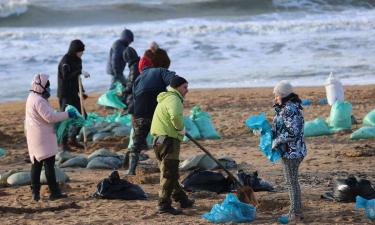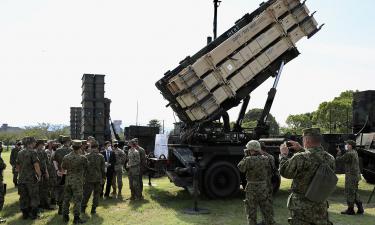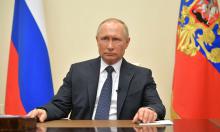A new Turkey for a new NATO
Turkey is coming to its senses after the NATO summit, which paralysed the centre of Istanbul. The summit is over and the country has found itself in the new role of a pilot fish showing the whale (meaning Europe, NATO, and the West as a whole) the way to the Muslim world.
Ankara has been preparing for this role. "Turkey is no longer a peripheral state but a key ally" for NATO. That phrase, which Foreign Minister Abdullah Gul uttered before the Istanbul summit and printed by many publications and repeated by other prominent Turks in one form or another, is absolutely true. If NATO really wants to deal with Iraq, Afghanistan and the Middle East (and the decisions of the Istanbul summit point to this), Turkey will be the key, or (geographically) border, state in this unexpected role for the alliance.
The roles of many other states that were important when NATO's only targets were the Soviet Union and the Warsaw Pact will change accordingly. They have not become aware of or expressed these new realities, but Turkey knows for sure that its situation is changing and will try to gain the maximum advantages.
It would be interesting to know what attitudes and ideas Turkey can offer NATO on the "eastern" (in the new meaning) direction. According to what Russia's Foreign Minister Sergei Lavrov told this correspondent in Istanbul, NATO and Moscow may have more points of contact than may seem at first glance, and Turkey can play its role in this context. He also inferred that Turkey's position is close to that of Moscow and several other European capitals.
Russia-Turkey relations are approaching the stage of "multidimensional partnership," said the minister, in part because they have "common regional interests," including in Iraq and Afghanistan.
Mr Lavrov mentioned more active Moscow-Ankara contacts. He said he would like Turkey to play a more active part in regional affairs and the world as a whole and recalled the common attitudes of the two countries "on the role of multilateral institutes and the UN in international affairs."
Turkey and Russia are also similar in that they are all but the only countries located simultaneously in Europe and in Asia, added Lavrov. Moreover, they have experience of harmonious relations between nations and religions.
Many European countries do not have such experience, simply because of their geography and the structure of their population. They are not regarded as "one of us" in the Muslim world, unlike Turkey.
This is probably why Abdullah Gul said in one of his eloquent statements in Istanbul about the Middle Eastern initiative of President George W. Bush: "Though Turkey supports the idea of change in the Muslim world, we have the following conditions: it should be not interference but partnership, not the enforcement [of ideas] but regional authorship."
Everything that happens in Iraq is vital for Turkey, above all because of the Kurds, who live in Northern Iraq and Southeast Turkey. Kurdish separatism has left 30,000 dead in Turkey. Consequently, Ankara desperately needs the occupation authorities to prevent the split of Iraq into several parts, including a Kurdish one, as this would encourage Turkish Kurds, many of whom had been hiding in Iraq, to act.
Another reason for Turkey's particular interest in Iraq is the business contacts at the medium and low levels. As India is a special country for Afghanistan, though an aloof onlooker will hardly see this, so Turkey is a special country for Iraq.
It should be remembered that Turkey, though it is a NATO member, did not allow US troops to use its territory for launching the war on Iraq. This is one more reason for the Turks to be seen as good neighbours.
It is logical that Ankara has become more active today, at the beginning of the transition of real sovereignty in Iraq to the Iraqis. Now is the time for mediators, countries such as Turkey (and, in a manner, Russia), which, by being both in the West and in the East, can advance their own ideas of what should be done in the Middle and Near East.
Since many European countries, especially small ones, avoided playing any role in the remote and strange Afghanistan and subsequently in Iraq, it is clear that Turkey will have the opportunity to play its special part. On the other hand, it is not clear what contribution can it make to the future of Iraq's and Afghanistan's recovery, as well as the Middle East settlement and how this may change the image of Turkey. So far, we hear only general statements, like the one made by Prime Minister Recep Tayyip Erdogan, who said that in the 21st century his country would become the symbol of harmony between cultures and civilisations in the epicentre of the geopolitical arena.
However, one thing is clear: the most impressive episode of the NATO summit was the speech by French President Jacques Chirac, who advised George W. Bush not to interfere in the European dispute over the admission of Turkey to the EU. This is certainly a painful question, but it seems now that Turkey will sail into the EU if it becomes indispensable for Europe's policy vis-а-vis Iraq and Afghanistan.
And the last thing. This current "chance for Turkey" looks strangely similar to the chance for Russia, if we can describe in this manner everything that happened in Russia-West relations after September 11, 2001, when they found a great number of common vital interests.
Subscribe to Pravda.Ru Telegram channel, Facebook, RSS!




